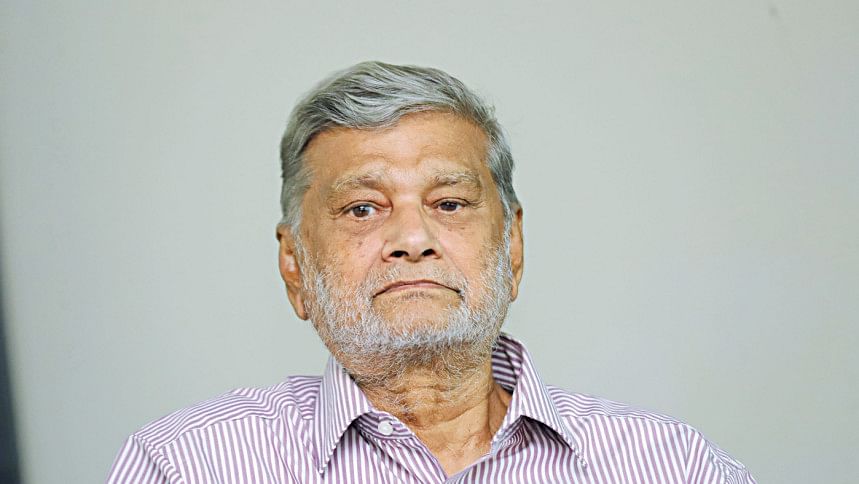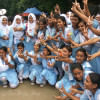Sustaining dev, curbing inequality major challenges

Sustaining the development that has taken place in Bangladesh in the past 14 years and curbing inequality are key major challenges facing the economy owing to the fallout of the coronavirus pandemic and the Russia-Ukraine war, said Planning Minister MA Mannan.
He said the economy always faces some challenges. Even regulated and stable economies experience pressure.
"Our challenge is to make the visible development that has taken place in the last 14 years sustainable," he said, during an interview with The Daily Star at its office in the capital recently.
Bringing the 100 per cent population under the electricity network, expanding access to education and developing physical infrastructure are among the attainments cited by the minister.
A former Civil Service of Pakistan cadre, Mannan served the government of Bangladesh in various positions after the country's independence.
He retired from government service in 2003 as the chairman of the Bangladesh Small & Cottage Industries Corporation, joined Bangladesh Awami League in 2005 and has been elected as a lawmaker three times since then.
According to Mannan, governments in the past used to provide subsidies to seeds and fertiliser alone. The Awami League government included farm machinery in the subsidy programme, thus raising production and cutting productivity loss.
Now, the challenge is to continue the support and make the inherent strength sustainable despite the pain of the pandemic and the current global uncertainty, he said.
Another challenge is posed by rising income inequality, he said.
"Though the growth of gross domestic product (GDP) has risen, the disparity has increased visibly."
The Gini coefficient related to income rose to 0.499 in 2022, up from 0.482 in 2016 and 0.458 in 2010, according to data from the Bangladesh Bureau of Statistics. Generally, a country is considered to have a higher income inequality if the Gini coefficient is above 0.50.
The minister said though inequality rose, hunger poverty and shelter poverty have reduced.
"The earnings of lower-income groups have increased, but it increased more for the upper-income groups. This has widened the inequality."
He said since the lower-income groups have advanced, the pain stemming from the rising inequality is relatively lower.
"However, I am not defending the inequality issue."
He said inequality is not expected, so the government is trying to bring it down and has taken several steps to this effect.
One of the initiatives is the Ashrayan Project, which is building homes for homeless and displaced people.
The minister said despite the pandemic, the economy has maintained its growth momentum. "This has been possible mainly for the leadership of Prime Minister Sheikh Hasina."
Despite the risk posed by Covid-19, Bangladesh went for partial lockdowns and factories were shut for less than two months, giving mileage to the economy since local demand revived while exporters were able to keep supplying goods to the global markets.
"Sheikh Hasina came forward with incentive packages. This was the first among all the countries in the world. As a result, the economy rebounded."
Bangladesh's economy grew 7.1 per cent in the last fiscal year and is estimated to have grown 6.03 per cent in FY23.
The minister thinks the health and education sectors have done extremely well in the past 14 years.
The life expectancy has risen and infant and maternal mortality rates have dropped.
He said urban medical facilities may not be up to the mark. He, however, praised community clinics in the rural areas.
In the education sector, the literacy rate reached 75 per cent, which is a big achievement, he said.
"Yes, there are some questions about quality."
The planning minister is confident about meeting inflation and GDP growth targets in the coming fiscal year, saying the goals were set considering previous data.
"If we can't meet the targets, at least we will try to reach closer to them."
The government is planning to achieve a 7.5 per cent GDP growth and keep inflation within 6 per cent.
Speaking about social safety net programmes, Mannan said mis-targeting has reduced significantly because people have become cautious.
"It is true that we could not cover all of the people who are eligible to be included," he said, adding that around three-fourths of the eligible people have been included in the social safety net programmes and the ratio will rise this year.
He said the government is always committed to working for the well-being of people all the time.


 For all latest news, follow The Daily Star's Google News channel.
For all latest news, follow The Daily Star's Google News channel. 








Comments